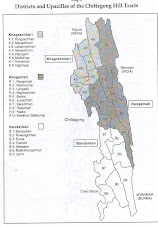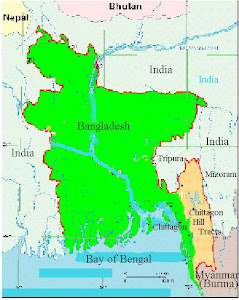Source: Kapaeeng Watch correspondent, The Daily Star, New Age and Prothom Alo.
CHT accord is to uphold hill people's rights and signed in full accordance with country's sovereignty, says Chief Advisor
On 27 March 2008 an opinion-exchange meeting was held by Chief Advisor of Caretaker Government Dr. Fakhruddin Ahmed with the government officials and people of different professional groups of the region at Rangamati Tribal Cultural Institute auditorium in Rangamati. Mr. Nurul Amin, Deputy Commissioner of Rangamati district presided over the meeting. Chairman of the CHT Regional Council Mr. Jyotirindra Bodhipriya Larma alias Santu Larma, Chief of Army Staff General Moeen U Ahmed and General Officer Commanding of 24 Infantry Division Major General Mohammad Abdul Mobin were present at the meeting. Divisional Commissioner of Chittagong division Mr. Hossain Zamil delivered welcome speech in the meeting.
Among others, Special Assistant to the Chief Adviser on Chittagong Hill Tracts (CHT) affairs and Forest and Environment affairs Raja Devashish Roy, Chairman of Rangamati Hill District Council (HDC) Mr. Jagat Jyoti Chakma, Chairman of Bandarban HDC Prof. Thanzama Lusai, Chairman of Khagrachari HDC Mr. Manidra Lal Tripura, President of Rangamati Headmen Association Mr. Binoy Kumar Dewan, Member of CHT Regional Council Mr. K S Mong, Member of Advisory Committee of CHT Affairs Ministry Md. Nurunnabi Chowdhury, leader of permanent Bengali resident Mr. Kazi Nazarul Islam, women rights activist Ms. Indrani Chakma, women entrepreneur Ms. Shefali Chakma, journalist Osman Goni spoke in the meeting. Besides, women rights activist Ms. Donai Prue Nelly, development activist Mr. Mongthowai Marma, former district education officer Mr. Anjulika Khisa, advocate Mostafa Kamal, among others, took part in the exchange of opinions during open discussion.
In his initial speech in the opinion-exchange meeting, Chief Adviser Dr. Fakhruddin Ahmed said that CHT Accord of 1997 was signed in full accordance with the country's sovereignty and integrity and for upholding the political, social, cultural, educational and economic rights of the peoples living in the hilly region. He also added that in conformity with the Accord, some government steps have already been taken and the process is on.
He said the CHT Regional Council, three Hill District Councils (HDCs) and the Land Commission have been formed through formulating appropriate laws. Of them, the Regional Council and the three HDCs are carrying on with their activities, and the HDCs are gradually turning into central points of development of the hill districts. He also said that many transferable matters have been given to the HDCs and the process of transferring six more affairs is being expedited.
About land-related problems in CHT, he said due to various problems and limitations, the Land Commission has not so far been able to work properly. The post of Chairman of the Land Commission fell vacant recently and the government is going to fill the vacancy soon. The government would take effective measures to recast the Land Commission to make it functional. He urged all have to work unitedly on the basis of mutual trust and confidence regarding land-related matters.
He said that as per the Accord, 65,000 repatriated refugees were rehabilitated under the agreed 20-point package facilities and other financial facilities. Task Force on rehabilitation of returnee refugees and internally displaced persons was formed in order to rehabilitate them.
Referring to various measures for the development of the CHT, he said the amount of annual allocation for the CHT has been increased after the CHT Accord. TK 2600 millions of Annual Development Programme (ADP) have been allotted for current fiscal year. He mentioned various development projects of the development partners for the development of this region, including the schemes undertaken by ADB, UNDP and UNICEF. He, however, said all had to be careful so that duplication did not take place in the development works of the government and NGOs to avoid misuse of resources.
On education, he stressed the need for establishing boarding schools at a greater rate in the hilly region to spread education and increase the literacy rate.
Referring to the recent infestation of rats in some upazilas of Rangamati and Bandarban, he assured the affected people of government steps to compensate them.
He put emphasis on further expansion of solar electricity in the CHT region. In this regard, the CA mentioned activities of the state-owned Infrastructure Development Company's project work in remote hilly areas for providing solar electricity.
On tourism, he said it is possible to build world-class tourist centres in the panoramic CHT region. He said the government would take all possible measures for the development of tourism in this area and ask the tourism ministry to soon prepare a comprehensive report consulting private sector in this regard.
On food-processing industry, he said the government would take all possible steps to create a favourable environment so that the private sector can come forward to invest in this sector.
Dr. Fakhruddin announced the following government decisions at an opinion-exchange meeting-
(a) introduction of mobile phone network in CHT, primarily in the three municipalities of Rangamati, Khagrachari and Bandarban. Setting up digital telephone exchanges in upazilas of the three hill districts would be considered provided availability of resources.
(b) within next month, a final decision on manpower would be taken for establishing three judge courts in the three hill district headquarters.
(c) to increase the allowance of indigenous headmen.
He said objective of the present government was to ensure socioeconomic and cultural progress of the CHT people, who need to maintain peace and discipline. He observed that the unfortunate situation that was created in the CHT in the past was overcome to a large extent today. He noted that all people of this region irrespective of ethnicity, language and culture and religious beliefs are citizens of Bangladesh. He said that present government wanted to create such an environment wherein all people would contribute to the advancement of the country by maintaining cordial relations, mutual trust and confidence. He sought cooperation from indigenous hill peoples and Bengali peoples of the region to make a success the transition to democracy through holding free, fair and neutral election next December to build a corruption-free prosperous and enlightened Bangladesh.
After closing the meeting, Dr. Fakhruddin Ahmed visited Rangamati Raj Bana Bihara (Buddhist temple) and called on Venerable Sadhananda Mahastabir alias Banabhante. He later left Rangamati in the afternoon for Bandarban where he stayed overnight and visited some indigenous villages this morning before return to Dhaka.
It is observed by the Kapaeeng Watch that during his first visit to CHT region since his assumption of office, the head of the Caretaker Government Dr. Fukhruddin Ahmed showed positive attitude to the CHT issues in his speech. However, it is also observed that he did not mention even single word on the burning issues of CHT, such as, withdrawal of temporary camps and de facto military rule 'Operation Uttoron' as per CHT Accord, Bengali settlers' issue and continuous land grabbing by the Bengali settlers, fresh settlement programme of Bengali settler families even during his period, preparation of voter list only with permanent residents of CHT as per CHT Accord, appointment of Chairman of CHT Development Board among from indigenous community and bringing it under overall supervision of CHT Regional Council as per CHT Accord etc. In other word, he indirectly supported to the ongoing land grabbing by the Bengali settlers in his speech by urging "to work unitedly on the basis of mutual trust and confidence regarding land-related matters". Even he did not clearly mention whether his government would undertake immediate initiative to amend the controversial provisions of the CHT Land Dispute Settlement Commission Act 2001. It is also worth mentioning that he used the derogatory term 'tribe/tribal' rather than 'indigenous people'.
It is reported that in organizing the opinion-exchange meeting, the government authority did not involve key institutions of the special administration system of CHT, namely, CHT Regional Council and three HDCs. The Chairmen and Members of these councils were invited as guest, but not host. It is one of the dishonor attitudes to the CHT institutions by the government.
skip to main |
skip to sidebar


Map of Bangladesh

CHTs is number one Milliary zone in the world


Ministry of Chittagong Hill Tracts Affairs
The United Nation
The IJPMNA
This page provides information of the minority Indigenous Jumma Peoples in Chittagong Hill Tracts (CHTs) Bangladesh.
Contact with this please write:-ijpnusa@yahoo.com
Contact with this please write:-ijpnusa@yahoo.com
About Us
Location of Jummaland

Jumma Videos
- The BANDARBAN SADAR
- The Rowangchari
- The Ruma
- The Lama
- The Thanchi
- The Alikadom
- The Naikhkhongchari
- The RANGAMATI SADAR
- The Baghaichari
- The Langudu
- The Nanyachar
- The Barkal
- The Jurachari
- The Bilaichari
- The Kaptai
- The Rajsthali
- The Kawkhali
- The KHAGRACHARI SADAR
- The Manikchari
- The Laksmichari
- The Mahalchari
- The Matiranga
- The Ramgarh
- The Dighinala
- The Panchari
Audio & Video
Jumma Natok (Drama)
International Support
Educational Institution
Religious Organization
Buddhist Studies

Map of Bangladesh
Mission of Bangladesh
About Bangladesh
Bangali Audio Songs
Bengali News

CHTs is number one Milliary zone in the world
Online Audios
Refugee in Homeland

Jumma Picture

Blog Archive
About Me
- The Indigenous Jumma Peoples Movement in North America
- The Chittagong Hill Tracts (CHT) region comprises three districts: Banderban , Khagrachari and Rangamati. The districts comprise seven main valleys formed by the Feni, Karnafuli, Chengi, Myani, Kassalong, Sangu and Matamuhuri rivers aid their tributaries and numerous hills, ravines and cliffs covered with dense vegetation, which are in complete contrast to most other districts of Bangladesh, which consist mainly of alluvial lands. Geographically the CHT can be divided into two broad ecological zones: (a) hill valley, (b) agricultural plains. It is surrounded by the Indian states of Tripura on the north and Mizoram on the east, Myanmar on the south and east and Chittagong district on the west.
